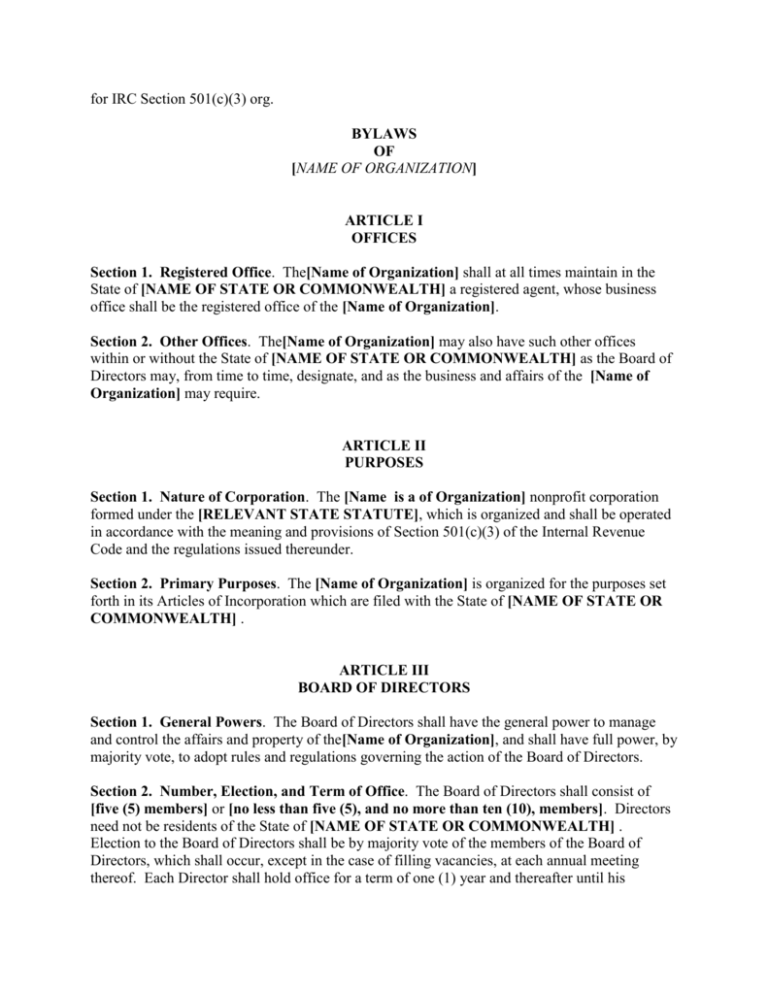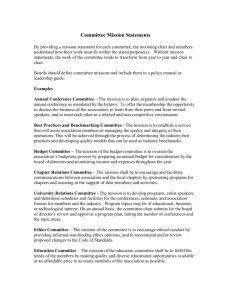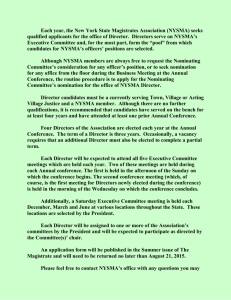Nonprofit Bylaws Template: 501(c)(3) Organization
advertisement

for IRC Section 501(c)(3) org. BYLAWS OF [NAME OF ORGANIZATION] ARTICLE I OFFICES Section 1. Registered Office. The[Name of Organization] shall at all times maintain in the State of [NAME OF STATE OR COMMONWEALTH] a registered agent, whose business office shall be the registered office of the [Name of Organization]. Section 2. Other Offices. The[Name of Organization] may also have such other offices within or without the State of [NAME OF STATE OR COMMONWEALTH] as the Board of Directors may, from time to time, designate, and as the business and affairs of the [Name of Organization] may require. ARTICLE II PURPOSES Section 1. Nature of Corporation. The [Name is a of Organization] nonprofit corporation formed under the [RELEVANT STATE STATUTE], which is organized and shall be operated in accordance with the meaning and provisions of Section 501(c)(3) of the Internal Revenue Code and the regulations issued thereunder. Section 2. Primary Purposes. The [Name of Organization] is organized for the purposes set forth in its Articles of Incorporation which are filed with the State of [NAME OF STATE OR COMMONWEALTH] . ARTICLE III BOARD OF DIRECTORS Section 1. General Powers. The Board of Directors shall have the general power to manage and control the affairs and property of the[Name of Organization], and shall have full power, by majority vote, to adopt rules and regulations governing the action of the Board of Directors. Section 2. Number, Election, and Term of Office. The Board of Directors shall consist of [five (5) members] or [no less than five (5), and no more than ten (10), members]. Directors need not be residents of the State of [NAME OF STATE OR COMMONWEALTH] . Election to the Board of Directors shall be by majority vote of the members of the Board of Directors, which shall occur, except in the case of filling vacancies, at each annual meeting thereof. Each Director shall hold office for a term of one (1) year and thereafter until his successor is elected and qualified. Section 3. Officers. The Board of Directors may designate from among its members a President, Vice-President, Secretary, Treasurer and such other officers as it may consider appropriate with such duties as it may prescribe. Section 4. Vacancies. Any vacancy occurring on the Board of Directors prior to the expiration of a term shall be filled by such person as shall be elected by the remaining members of the Board of Directors. A Director so elected to fill a vacancy shall hold office for the unexpired term of his predecessor in office. Section 5. Annual and Regular Meetings. The Board of Directors shall hold an annual meeting at such time and place as the Board of Directors shall by resolution prescribe. The Board of Directors may by resolution prescribe the time and place of such other regular meetings. Section 6. Special Meetings. Special meetings of the Board of Directors may be called by or at the request of the President or any two Directors. The person or persons authorized to call special meetings of the Board of Directors may fix any reasonable date, hour, and place, either within or without the [NAME OF STATE OR COMMONWEALTH], as the date, hour, and place for holding any special meeting of the Board called by them. Section 7. Notice. Notice of any special meeting of the Board of Directors shall be given at least fifteen (15) days previously thereto by written notice delivered personally or sent by mail, telegram, facsimile or other means of electronic transmission to each Director at his address as shown in the records of the [Name of Organization]. If mailed, such notice shall be deemed to be delivered when deposited in the United States mail in a sealed envelope so addressed, with postage prepaid. If notice be given by telegram, such notice shall be deemed to be delivered when the telegram is delivered to the telegraph company. Any Director may waive notice of any meeting. The attendance of a Director at any meeting shall constitute a waiver of notice of such meeting, except where a Director attends a meeting for the express purpose of objecting to the transaction of any business because the meeting is not lawfully called or convened. The business to be transacted at, and the purpose of, any annual meeting of the Board of Directors need not be specified in the notice or waiver of notice of such meeting. Section 8. Quorum and Proxies. A majority of the total number of Directors in office shall constitute a quorum for the transaction of business at any meeting of the Board of Directors; but, if less than a majority of the Directors are present at said meeting, a majority of the Directors present may adjourn the meeting from time to time without further notice. Proxies shall not be permitted. Section 9. Manner of Acting. The act of a majority of the Directors present at a meeting at which a quorum is present shall be the act of the Board of Directors, unless the act of a greater number is required by law or by these Bylaws. Section 10. Compensation. Directors as such shall not receive any stated salaries for their services but may be reimbursed for reasonable expenses. Nothing herein shall be construed to preclude any Director from serving the [Name of Organization] in any other capacity and receiving compensation therefor. Section 11. Informal Action. Any action may be taken without a meeting of the Directors if a consent in writing setting forth the action so taken shall be signed by all of the Directors. Section 12. Resignation; Removal. (a) A Director may resign from the Board of Directors at any time by giving notice of his resignation in writing addressed to the President or Secretary of the[Name of Organization] or by presenting his written resignation at an annual, regular, or special meeting of the Board of Directors. (b) Except as otherwise provided by law, at any meeting of the Board of Directors called expressly for that purpose, any Director may be removed, with or without cause, by the vote of a majority of the Directors then in office. ARTICLE IV REGULAR COMMITTEES Section 1. Purposes. The Board of Directors may establish such regular committees to assist it in the performance of its duties as it considers appropriate. Section 2. Number, Election, and Term of Office. The number of members of each regular committee shall be determined by the Board of Directors. Members of each regular committee shall be elected by the affirmative vote of a majority of the Board of Directors and shall serve until resignation or removal by the affirmative vote of a majority of the Board of Directors. Section 3. Officers. The President may designate from among the members of each regular committee a Chairman and Vice Chairman of such committee, and such other officers as the President may determine. The Chairman, Vice Chairman, and any other officers of each such committee shall have such duties as the President prescribes. Section 4. Vacancies. Vacancies in the membership of any committee shall be filled by the Board of Directors. Section 5. Quorum. Unless otherwise provided in the resolution of the Board of Directors designating a committee, a majority of the whole committee shall constitute a quorum and the act of a majority of the members present at the meeting at which a quorum is present shall be the act of the committee. Section 6. Rules. Each committee may adopt rules for its own government not inconsistent with the Bylaws or with rules adopted by the Board of Directors. Section 7. Powers. Each regular committee shall have such powers as the Board of Directors may grant it consistent with law, the Articles of Incorporation, and the Bylaws. ARTICLE V ADVISORY COMMITTEES Section 1. Purpose. The Board of Directors may establish a Campus Advisory Board and such other advisory committees as it considers appropriate. The purpose of all such committees shall be to advise the Board of Directors on such matters relating to the [Name of Organization] as the Board of Directors designates. Section 2. Number, Election, and Term of Office. The number of members of each advisory committee shall be as determined by the Board of Directors. Members of each advisory committee shall be elected by the affirmative vote of a majority of the Board of Directors and shall serve until resignation or removal by the affirmative vote of a majority of the Board of Directors. Section 3. Powers. Each advisory committee shall have the power to advise the Board of Directors and such other powers as the Board of Directors may grant it consistent with law, the Articles of Incorporation, and the Bylaws. ARTICLE VI OFFICERS Section 1. Officers. The Officers of the [Name of Organization] shall be a President, Vice President, Secretary, Treasurer, and such other Officers as may be elected in accordance with the provisions of this Article. Not more than one office may be held simultaneously by the same person. Section 2. Election and Term of Office. The Officers of the [Name of Organization] shall be elected by a majority vote of the members of the Board of Directors at the organizational meeting and at every annual meeting of the Board thereafter, except that new offices may be created and filled at any meeting of the Board of Directors. Each Officer shall hold office for a term of one (1) year and thereafter until his successor shall have been duly elected and qualified. Section 3. Removal. Any Officer may be removed upon an affirmative vote of two-thirds of the entire Board of Directors, whenever in its judgment the best interests of the [Name of Organization] would be served thereby. Section 4. Vacancies. A vacancy in any office because of death, resignation, removal, disqualification or otherwise, may be filled by the Board of Directors for the unexpired portion of the term. Section 5. President. The President shall be the chief executive officer of the [Name of Organization] and, in general, shall supervise and control all of the business and affairs of the [Name of Organization]. He may sign, with the Secretary or any other proper Officer of the [Name of Organization] authorized by the Board of Directors, any deeds, mortgages, bonds, contracts, or other instruments or documents which the Board of Directors has authorized to be executed; and he shall perform all such other duties as may be prescribed by the Board of Directors from time to time. Section 6. Vice President. In the event the death, resignation or removal of the President, the person who serves as Vice President shall assume the office of President until the Board of Directors elects a successor to the President and shall perform all such other duties as may be prescribed by the Board of Directors from time to time. Section 7. Secretary. The Secretary shall keep the minutes of the meetings of the Board of Directors; see that all notices are duly given in accordance with the provisions of the Bylaws or as required by law; be custodian of the corporate records and seal; and perform such other duties as from time to time may be assigned to him by the President or by the Board of Directors. Section 8. Treasurer. The Treasurer shall be responsible for all funds and securities of the [Name of Organization]; receive and give receipts for monies due and payable to the [Name of Organization]and deposit all such monies in the name of the [Name of Organization]in such banks, trust companies or other depositories as shall be selected in accordance with the provisions of the Bylaws; and perform such other duties as from time to time may be assigned to him by the President or by the Board of Directors. If required by the Board of Directors, the Treasurer shall give a bond for the faithful discharge of his duties in such sum and with such surety or sureties as the Board of Directors shall determine. ARTICLE VII CONTRACTS, CHECKS, DEPOSITS AND FUNDS Section 1. Contracts. The Board of Directors may authorize any Officer or Officers, agent or agents of the [Name of Organization], in addition to or in place of the Officers so authorized by the Bylaws, to enter into a contract or execute and deliver any instrument or document in the name and on behalf of the [Name of Organization], and such authority may be general or confined to specific instances. Section 2. Checks, Drafts, and Similar Documents. All checks, drafts or orders for the payment of money, notes or other evidences of indebtedness issued in the name of the [Name of Organization], shall be signed by such Officer or Officers and/or agent or agents of the [Name of Organization] and in such manner as shall from time to time be determined by resolution of the Board of Directors. Section 3. Deposits. All funds of the [Name of Organization] shall be deposited from time to time to the credit of the [Name of Organization] in such banks, trust companies or other depositories as the Board of Directors may select. Section 4. Gifts and Contributions. The Board of Directors may accept on behalf of the [Name of Organization] any contribution, gift, bequest, or devise for the general purposes or for any special purpose of the [Name of Organization]. Such contributions, gifts, bequests, or devises shall be in conformity with the laws of the United States, the State of [NAME OF STATE OR COMMONWEALTH], and any other relevant jurisdiction. ARTICLE VIII BOOKS AND RECORDS The [Name of Organization] shall keep correct and complete books and records of account and also shall keep minutes of the proceedings of its Board of Directors and committees having any of the authority of the Board of Directors. ARTICLE IX FISCAL YEAR The fiscal year of [Name of Organization] shall begin on the first day of January and end on the last day of December in each year. ARTICLE X WAIVER OF NOTICE Whenever any notice is required to be given under the provisions of the law of [NAME OF STATE OR COMMONWEALTH] or under the provisions of the Articles of Incorporation or the Bylaws of the [Name of Organization], a waiver thereof in writing signed by the person or persons entitled to such notice, whether before or after the time stated therein, shall be deemed equivalent to the giving of such notice. ARTICLE XI AMENDMENTS TO BYLAWS The Bylaws may be altered, amended or repealed and new Bylaws may be adopted by majority vote of the Board of Directors present at any annual, regular or special meeting, if at least fifteen (15) days written notice is given of intention to alter, amend or repeal the Bylaws or to adopt new Bylaws at such meeting.







